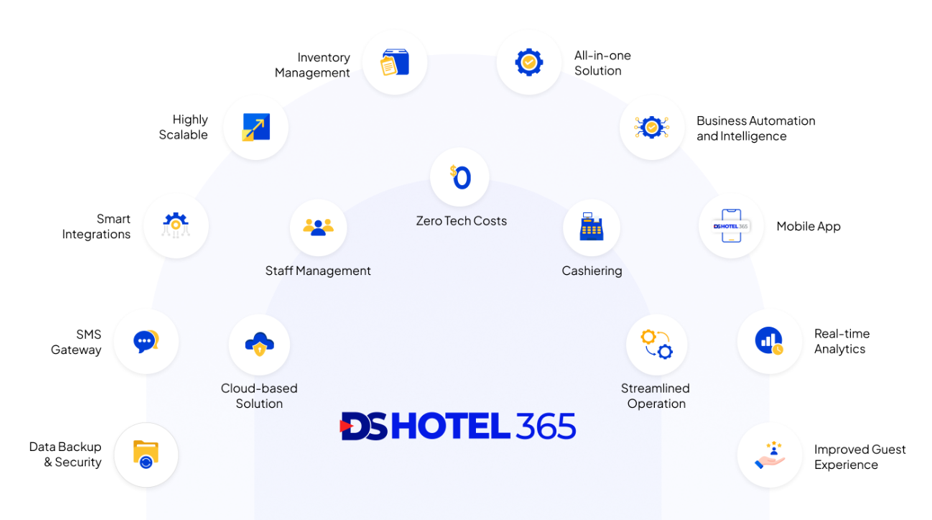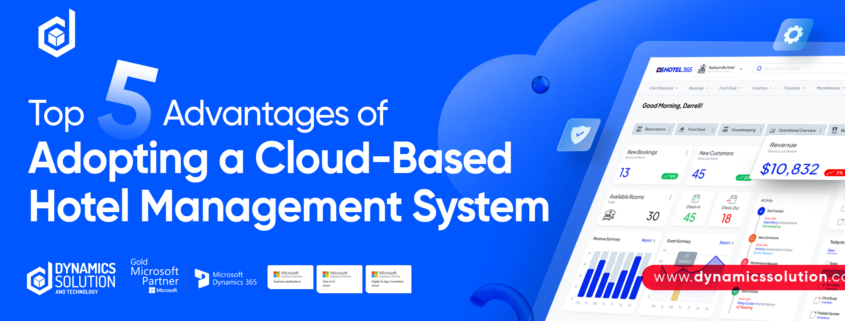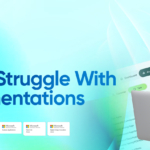The hospitality industry, a timeless testament to human connection and exploration, is currently navigating one of its most significant transformations. Gone are the days when property management solely revolved around meticulously kept ledger books and the charisma of the front desk staff. The digital age, accelerated by recent global shifts, hasn’t just knocked on the door of hospitality but has invited itself in, unpacked its bags and is fundamentally reshaping how hotels operate and engage with their guests.
The projection of the global hotel market is expected to reach $5.8 trillion by 2027 which isn’t just a number but a clarion call for efficiency, innovation and unparalleled guest-centricity.
A Digital Renaissance in Hotel Property Management
Cast your mind back, for a moment, to not-so-distant past. Reservations were often a symphony of phone calls, fax machines and manual entries into oversized binders. Room assignments were like some scattered pieces glued together on a physical board, and guest preferences, if recorded at all, were often lost in a shuffle of handwritten notes.
Housekeeping relied on walkie-talkies and checklists while night audits were a painstaking reconciliation of paper trails. This was a time of dedicated, hardworking individuals but also a time of operational silos, potential human error and a delayed response to the guest’s needs.
Then came the digital dawn that brought with it Enterprise Resource Planning (ERP) systems which began to centralize back-office functions and Customer Relationship Management (CRM) platforms that aimed to build a more cohesive picture of the guests. These were pivotal advancements, laying the groundwork for a more integrated approach. Yet, the true revolution with the advent of cloud computing.
Cloud Capabilities Powering Modern Hospitality
The impact cloud computing across every conceivable industry has been profoundly concrete. From finance to healthcare, retail to manufacturing, businesses are migrating toward cloud-based solutions and have unlocked unprecedented levels of agility, scalability and collaborative power. Data became accessible beyond the confines of a single office, software updates happened seamlessly and the burden of maintaining expensive, on-premise hardware began to lift.
The hospitality sector, with its dynamic, 24/7 operational demands and its core mission of delivering exceptional experiences, was a prime candidate for this cloud-driven metamorphosis. The cloud-based Hotel Management System (HMS) isn’t just an upgrade of old software, it’s the digital backbone that empowers hoteliers to streamline their intricate property operations with an elegance and efficiency previously unimaginable, turning data into insights and interactions into lasting loyalty.
So, what makes a cloud-based HMS the new normal for modern hoteliering? Let’s delve into the top five advantages that are compelling properties worldwide to make the ascent to the cloud.
The Top 5 Advantages of Adopting a Cloud-Based Hotel Management System
1. Streamlined Operations and Elevated Productivity
Cloud HMS platforms consolidate reservation, check-in/out, room assignment and housekeeping workflows into a single interface. Removing redundant data entry and manual handoffs reduces front-desk processing time.
Integrated mobile housekeeping apps update room status in real time that cut communication lag and boost room-turn efficiency by over 25%. Automated rate and inventory updates prevent overbooking and accelerate audit closing, ultimately freeing staff to focus on guest engagement rather than administrative tasks.
2. Enhanced Guest Experience and Personalization
Modern travelers expect seamless, contactless interactions, from online check-in to digital key access via mobile apps. Cloud-native platforms leverage AI-powered chatbots for 24/7 guest assistance and predictive analytics to surface personalized upsell offers (spa packages, room upgrades) based on guest history. IoT integration enables in-room automation, such as smart climate control and occupancy sensors that elevates comfort and capture preference data for future stays.
3. Data-driven Revenue Management
A unified cloud HMS aggregates real-time booking data, market trends and competitor rates into a central dashboard, empowering revenue managers with actionable insights at their fingertips. Machine learning algorithms can then forecast demand, optimize dynamic pricing and identify ancillary revenue opportunities to boost RevPAR and total revenue by as much as 15–20% within the first year of deployment.
4. Cost Efficiency, Scalability & Mobility
The financial argument for cloud-based HMS is compelling. Traditionally, implementing a hotel management system meant significant upfront capital expenditure that included purchasing powerful servers, dedicated IT infrastructure, software licenses and often, hiring specialized IT personnel to install, configure and maintain it all. This was a barrier, especially for independent hotels and smaller chains.
A cloud-based HMS flips this model on its head with:
Reduced Upfront Investment:
The primary infrastructure is hosted and managed by the provider. This means no heavy server costs or complex installations on your property.
Subscription-based Model (SaaS):
Most cloud HMS operate on a Software-as-a-Service (SaaS) model, translating to predictable monthly or annual subscription fees. This shifts IT spending from a capital expense (CapEx) to an operational expense (OpEx), making budgeting far more manageable.
Lower IT Overhead:
The need for an extensive in-house IT team to manage the HMS is drastically reduced. Updates, security patches and routine maintenance are handled remotely by the provider, freeing up your resources.
Energy Savings:
Fewer on-site servers mean lower electricity consumption and cooling costs.
This cost-effectiveness doesn’t equate to compromised capability, rather, it democratizes access to powerful, enterprise-grade technology.
5. Future-Ready Tech Integration (AI and IoT)
Cloud architectures offer open APIs and modular frameworks that seamlessly integrate emerging technologies. Leading Middle East properties are piloting AI-driven facial recognition for secure, contactless check-in while IoT sensors monitor energy usage and predict maintenance needs before failures occur.
As AI in cloud environments matures, hotels can tap into predictive guest sentiment analysis, automated content generation for marketing and advanced anomaly detection for security without overhauling core infrastructure.
Now having said all this, the question arises, what cloud-based hotel management system will be suitable for your hotel?
Introducing DS Hotel 365: Your Partner in Hospitality Excellence
Understanding these profound advantages is one thing; finding the right cloud-based Hotel Management System that embodies them seamlessly is another. In a market with numerous options, discerning hoteliers seek a solution that is not only technologically advanced but also backed by deep industry expertise and a commitment to client success.
This is where DS Hotel 365 by Dynamics Solution and Technology emerges as a beacon.
Dynamics Solution and Technology isn’t just another software vendor but a formidable team of over 100 Microsoft professionals, their foundation is built on trust and a profound understanding of business processes. Every consultant has journeyed through complete product cycles, ensuring they don’t just speak tech-talk, but truly comprehend your operational realities and can facilitate solutions in real-time.
DS Hotel 365 is an innovative and integrated cloud solution meticulously developed on Microsoft Dynamics 365 Business Central platform. It’s engineered to not only meet your current needs but to evolve with your guests’ expectations. It’s particularly lauded by 5-star hotels, especially within the MENA and Gulf regions, for its comprehensive capabilities.
Essential Features of DS Hotel 365
DS Hotel 365 anticipates your every need, delivering a seamless, unified experience from the first click of a reservation to the final farewell at check-out. It masterfully orchestrates:

- Reservation Management with real-time channel distribution, rate parity and loyalty integrations.
- Front Desk Operations with contactless check-in/out, digital keys and guest profiling.
- Housekeeping Management with mobile task assignments, status tracking and IoT-driven room readiness.
- Channel & Revenue Management with AI-based dynamic pricing, OTA integration and centralized inventory.
- Guest Relationship Management to provide 360° guest profiles, personalized marketing campaigns and feedback loops.
- Point-of-Sale (POS) & Billing with unified F&B outlets, retail POS and automated invoicing.
- Reporting & Analytics with customizable dashboards for KPIs like RevPAR, ADR,and occupancy.
- Security & Compliance with role-based access, data encryption and regional regulatory adherence.
Elevate Your Hospitality with Dynamics Solution and Technology
The journey to operational excellence and unparalleled guest satisfaction in today’s hospitality market depends on smart technology choices. Adopting a cloud-based Hotel Management System can future-proof your business by empowering your staff and delighting your guests.
If you’re ready to move beyond the limitations of outdated systems and embrace a solution that offers power, flexibility and a genuine partnership, then it’s time to explore DS Hotel 365. Partner with Dynamics Solution and Technology. Let us show you how DS Hotel 365 can revolutionize your hotel management experience, allowing you to focus on creating unforgettable stays while we ensure your operations run like a dream.
Contact us for an efficient, profitable and guest-centric future.







